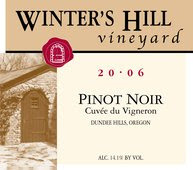This weekend, we celebrated the 2nd annual Wine and Word tasting at Winter's Hill Vineyard. I wrote about last year's reading here, and the pairing of wine--or food--with texts. It's natural, I think, to bring them together; say what you will about eating only at a table with cutlery and dishes, sipping while reading (or nibbling while reading) is comfortable, comforting--fun.

Reading aloud and in company is also about listening. I knew the work of the day's readers prior to the event, but I hadn't heard every poem, every observation. Even those poems I had read myself or heard the poet read before were new, read in a new context, new surroundings. The inflections were new, as Saturday's voice is not precisely Friday's, or Monday's.
I read a selection from Beyond the Islands, my translation of Alicia Yánez Cossío's Más allá de las islas. It's one my of my favorite bits, in which the poet Alirio, his muse fled, finds himself speechless before the big, big sea, repeating the (likely apocryphal) words of one historical figure or another that were drilled into his brain in 4th grade social studies. I also read a bit of my novel manuscript, Fishbowl. It was the first time I'd taken it out on the road, so to speak, reading to other than a hand-picked audience of friends and critique partners.
 I love reading aloud. Maybe I just like the sound of my own voice. Maybe I'm trying to fill the void left by children who now read their bedtime stories to themselves. But I enjoy the performance, the theatricality, and the living, breathing audience right there. It's a kind of instant gratification, after months of working on a manuscript quietly, alone.
I love reading aloud. Maybe I just like the sound of my own voice. Maybe I'm trying to fill the void left by children who now read their bedtime stories to themselves. But I enjoy the performance, the theatricality, and the living, breathing audience right there. It's a kind of instant gratification, after months of working on a manuscript quietly, alone. As before, we prepared tasting notes. The poets organized their poems into flights, much as winemakers and sommeliers might present a selection of wines for sampling. These are my tasting notes for the Beyond the Islands:
Beyond the Islands is set in the Galápagos, and also beyond: these are the Galápagos reinvented. Pair the rich and varied cast of characters (pirates, settlers, tourists, botanists) with a lush and many-layered Pinot Noir like the Winter's Hill 2006 Dundee Hills. Hints of dark cherry, pepper, and musk resonate with the adventurers who try to make a place for themselves in the inhospitable islands; the complex flavors of the wine will warm the cold February evening you might spend in the company of Alirio, a prodigious poet anxious to recover his muse.
Thanks to all who came out to join us, and thanks to Beroldingen Cheese and Full Circle Creamery for sharing luscious artisanal cheeses with readers and guests. And if you missed it, the books are available through the following links:
Kelly Terwilliger, A Glimpse of Oranges (Finishing Line Press)
Barbara Drake, Peace at Heart (Oregon State UP); Driving One Hundred (Windfall Press)
Karen McPherson, Sketching Elise (Finishing Line Press)
Amalia Gladhart (trans.), Alicia Yánez Cossío, Beyond the Islands (UNO Press)





